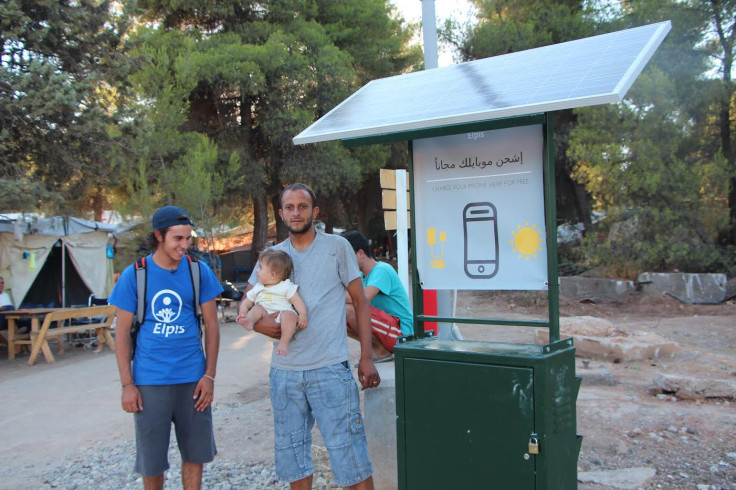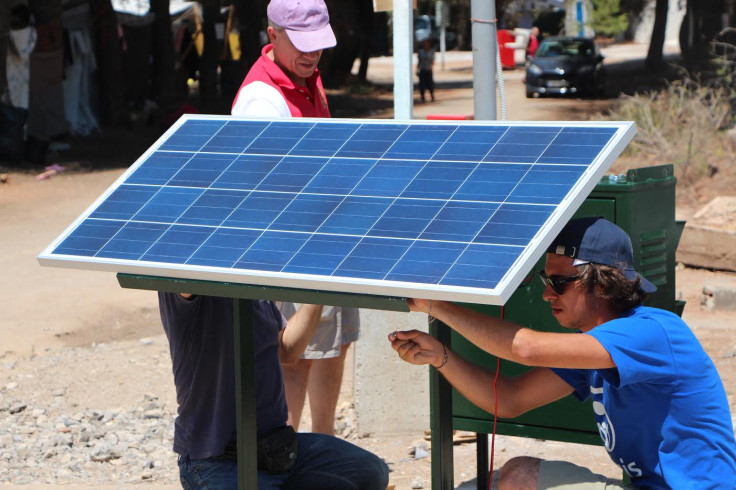Why we travelled to Greece to build solar-powered phone charging stations at refugee camps
Renewables aid crisis management, give autonomy to refugees and lower the economic burden for local communities.

The Middle East and Europe are currently facing the biggest wave of displaced people since World War Two. In an attempt to reach safety and shelter, more than 850,000 refugees have crossed the Aegean Sea in a bid to flee their countries' crimes against humanity.
With over 156,000 arrivals this year and closed borders beyond Greece, access to electricity within refugee camps has become an essential need, especially to charge mobile phones.
Mobile phones are a vital means of allowing refugees to seek out important information, reducing susceptibility to fraud, clarifying rumours, and allowing communication with family while safeguarding their most important memories.
As students studying environmental sciences, we were frustrated by the lack of solutions to this humanitarian crisis, and thought we could do something about the mobile charging problem by creating Project Elpis (Greek for Hope).
After a visit of one of our founders, 20-year-old Alexandros Angelopoulos, to the island of Samos, one of the entry points into Europe for nearly a million people fleeing wars and poverty in the Middle East and beyond, it became clear there was a real need. People started asking for his phone to call family and use the internet; often they were stranded at the port sharing one plug.
Project Elpis now provides emergency aid to refugees through solar-powered mobile phone charging stations. Outfitted with 12 plugs, each unit can charge devices simultaneously every hour for 10 hours each day – that's 120 devices a day, 3,600 people empowered per month.
Although it may seem like a simple action, the effect it has is multi-fold. Not only does this system help provide access to information and communication with loved ones, it also provides flexibility and energy autonomy to the refugee camps. These results are attained while lowering the economic and environmental burden that already resource-strained local communities often suffer with.

In line with this mission, we're proud to collaborate with a Greek solar technology company, Entec, to produce our hubs. This leveraging of local partnerships ensures the devices are implemented correctly and helps spur a change in the culture of managing this crisis by providing benefits to the community backers who are investing their time and money in aid effort.
Elpis showcases how renewables can aid crisis management while providing economic, social, and environmental benefits across all involved participants – it's a first in crisis management. With solar hubs already in action in five refugee camps in Greece, no sliver of doubt remains about the importance of sustainable off grid electricity in these locations. Our goal is to make our social venture financially sustainable over the long term and provide electricity as well as internet services in refugee camps and communities worldwide. We are currently collaborating with Edinburgh University's start-up incubator (LaunchEd) to explore further funding mechanisms for added services such as the internet.
A UNHCR report from February 2016 showed that 86% of Syrians arriving in Europe have access to a smartphone. However only 46% of them receive enough assistance with access to electricity to charge their phones along the route. We have now gained access to over half of the 33 refugee camps in Greece, with camp managers, local municipalities and the military being thrilled about our solution.
At the Kara Tepe the camp manager Stavros Miroyiannis expressed his support: "You should've brought it yesterday and not one, but four."
Part of Miroyiannis's vision is to soon be able to power the flagship camp in Lesvos entirely by using solar energy.
Sam Kellerhals is a third year environmental sciences student at the University of Edinburgh
© Copyright IBTimes 2025. All rights reserved.





















